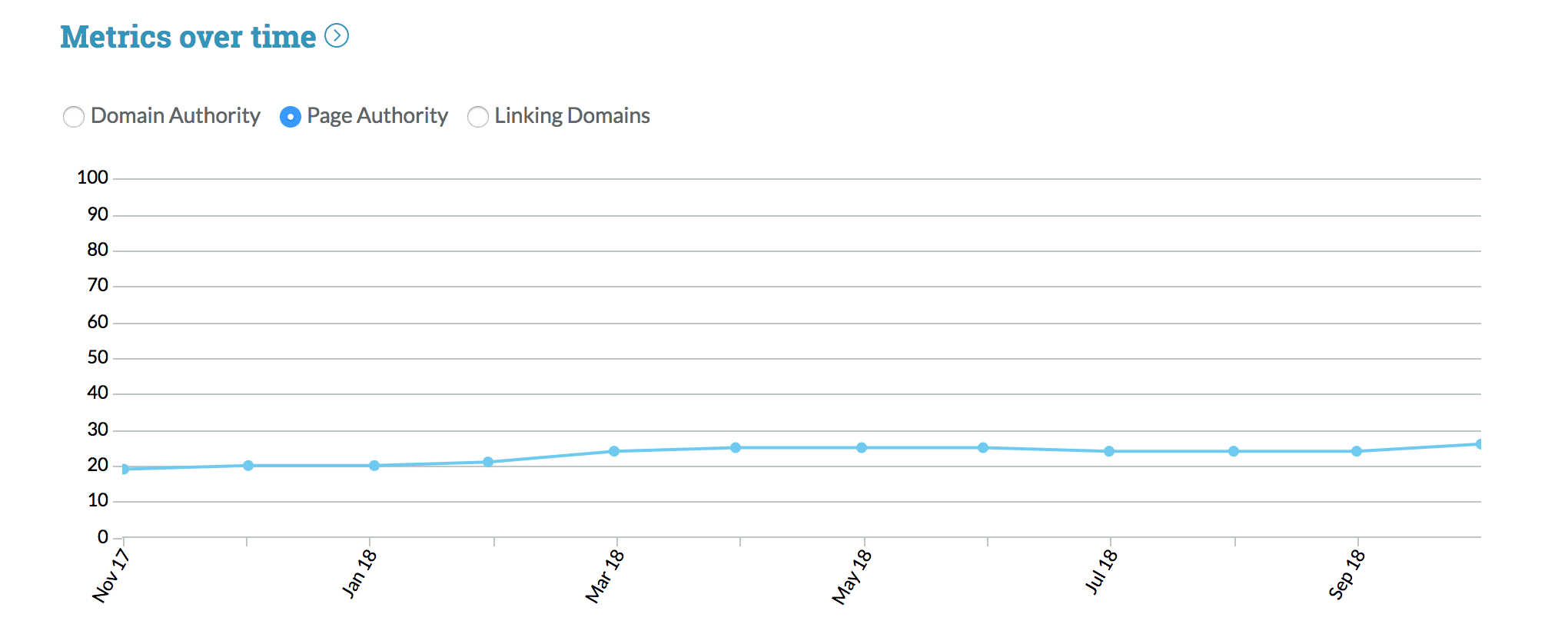What is Page Authority?
Page Authority is a scoring system created by Moz that predicts an individual page’s ability to rank in search engine results.
How Page Authority works
Page Authority scores range from one to 100. The closer a page’s score is to 100, the easier it will be for that page to rank well in search.
It’s important to note, though, that Page Authority scores don’t come from search engines themselves.
Google used to show page scores with Toolbar PageRank, but stopped sharing these scores publicly on April 15, 2016. As a result, many SEOs began using the Page Authority metric from Moz to evaluate their pages.
Today, there are several other software companies that offer tools for evaluating pages’ ranking ability. While these companies each have their own methods of calculating a page’s authority, the main factors involved are the same for each.
That’s because a page’s ranking power is largely dependent on its backlink profile, or the quality and quantity of links pointing to that page.
If you’re not yet measuring Page Authority, you can get started using Moz’s MozBar. You can also find page scores (called “URL Rating”) in Ahrefs.

Page Authority history
Google used to offer its own metric for measuring the authority of individual pages in Toolbar Pagerank. PageRank is still used as part of their algorithm, but the company stopped sharing scores in 2016.
As a result, an increasing number of SEOs switched to Page Authority for measuring their pages’ ranking power and third-party tools like Moz became essential.
Page Authority uses
Looking at Page Authority scores is an easy way to measure the strength of a page’s backlink portfolio. This gives you an idea of that page’s potential ranking ability, as well as how much work it will take to achieve the rankings you want.
Plus, since you can check the Page Authority of any page (and not just the ones on your own site), it can also be a useful metric for gauging where your pages stand in comparison to your competitors’ top pages.
Finally, checking Page Authority is a helpful step in identifying targets for link building. Improving your site’s authority requires earning links from other authoritative sites, so it’s in your best interest to focus your efforts on pages with relatively high scores.
Page Authority misunderstandings
Although Page Authority is a useful metric, it’s not intended to be 100% accurate predictor of rankings. This means that you’re not automatically guaranteed top rankings just because a tool shows you a relatively high Page Authority score.
It’s also important to understand that Page Authority is not an absolute metric. It’s a comparative one, meaning that it’s intended to show a page’s ranking power in comparison to other pages.
As a result, your Page Authority will not necessarily show steady increases over time, even with a strong link building strategy. Page Authority calculations are based on a logarithmic score which means it is easier to increase from 15 to 20 than from 60 to 65.
Because Page Authority is a comparative score, your competitors’ pages will also be taken into account. If your competitors build their backlink profiles at the same rate as you, you may not see the kind of increases you want.
This does not mean, however, that Page Authority is not worth your time. If your competitors are building links and you aren’t, they’ll quickly outpace you and earn higher comparative scores — pushing your site down in the rankings for competitive terms.
It’s worth noting, though, that because Page Authority changes in accordance with all other online content (and not just your competitors’), it’s not an ideal metric for measuring your SEO strategy’s effectiveness. You can’t directly control it, and it can change entirely independently of any changes you make.
This means it’s best used as a directional metric for your site’s performance, and not as a core part of your reports.
Page Authority vs. Domain Authority
Page Authority and Domain Authority are often used interchangeably, but they’re not the same metric.
Page Authority measures the ranking power of an individual page, while Domain Authority indicates the strength of a site as a whole.
Both are calculated using backlink profiles, but important to know which you’re looking at when evaluating the ranking potential of your (or a competitor’s) website.
What is a good page authority?
A “good” page authority is usually between 40-60, with over 60 being considered high and extremely authoritative while under 40 is less likely to rank for your targeted keyword term or phrase.
Of course, like most things in SEO, a “good” page authority depends on your space and competitors and what else is ranking. Essentially, your page authority (which is driven off of links primarily) should be equal to or greater than the competing pages if you’re going to outrank them.
Does Google use Page Authority in their algorithms?
No, Google does not use Page Authority in their algorithms. Page Authority is a term and metric that was created by the SEO tools company Moz around 2010 and it became widely used and accepted in the industry though other tools like Semrush and Ahrefs have launched their own metrics which have also gained traction as Moz stopped updating Page Authority.
Google does use similar metrics to Moz, such as link-based signals, but Google does not use Moz’s Page Authority metric in their algorithms.


